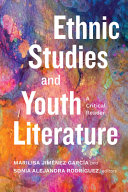2018 School Spending Survey Report
Ethnic Studies and Youth Literature: A Critical Reader
To Be Determined.
(SUNY series in Multiethnic Literatures).
Jul. 2025.
210p.
ed. by García, Marilisa Jiménez & Sonia Alejandra Rodríguez, eds.
Tr $120. ISBN 9798855802986.
COPY ISBN
 This bold and necessary collection brings together scholars, educators, and writers who challenge assumptions and ideas about youth literature, calling for a deeper, more intentional engagement with ethnic studies frameworks. Through an array of critical perspectives, including Native Studies and womanism, the volume that asks: “Who is telling the story?” and “Who gets to decide what stories matter?” Chapters examine everything from colonial legacies in school library collections to the pitfalls of representation without critique. The tone is urgent and scholarly, but accessible, making it ideal for teacher preparation programs, LIS coursework, and professional learning communities. Each chapter pushes readers to think beyond surface-level inclusion and toward structural change. Discussions of intersectionality, storytelling as resistance, and historical recovery are anchored by close literary analysis and compelling theoretical insights. The book also models the practices it advocates, centering scholars of color while asking tough, necessary questions. The editors address the limits of empathy, cautioning against relying on that alone to address systemic inequities in youth literature and education. This text is a standout in critical youth literature scholarship. It should be required reading for future teachers and librarians alike.
This bold and necessary collection brings together scholars, educators, and writers who challenge assumptions and ideas about youth literature, calling for a deeper, more intentional engagement with ethnic studies frameworks. Through an array of critical perspectives, including Native Studies and womanism, the volume that asks: “Who is telling the story?” and “Who gets to decide what stories matter?” Chapters examine everything from colonial legacies in school library collections to the pitfalls of representation without critique. The tone is urgent and scholarly, but accessible, making it ideal for teacher preparation programs, LIS coursework, and professional learning communities. Each chapter pushes readers to think beyond surface-level inclusion and toward structural change. Discussions of intersectionality, storytelling as resistance, and historical recovery are anchored by close literary analysis and compelling theoretical insights. The book also models the practices it advocates, centering scholars of color while asking tough, necessary questions. The editors address the limits of empathy, cautioning against relying on that alone to address systemic inequities in youth literature and education. This text is a standout in critical youth literature scholarship. It should be required reading for future teachers and librarians alike.
VERDICT Highly recommended. An excellent, perspective-expanding resource that challenges readers to critically examine youth literature through an ethnic studies lens.
RELATED
ALREADY A SUBSCRIBER? LOG IN
We are currently offering this content for free. Sign up now to activate your personal profile, where you can save articles for future viewing





Be the first reader to comment.
Comment Policy:
Comment should not be empty !!!